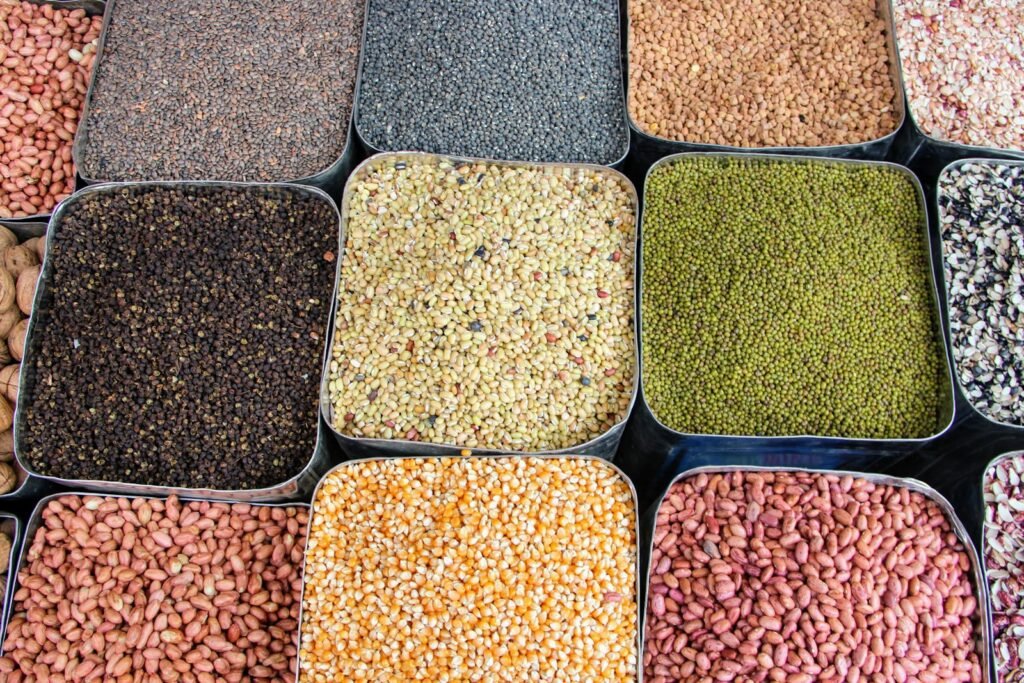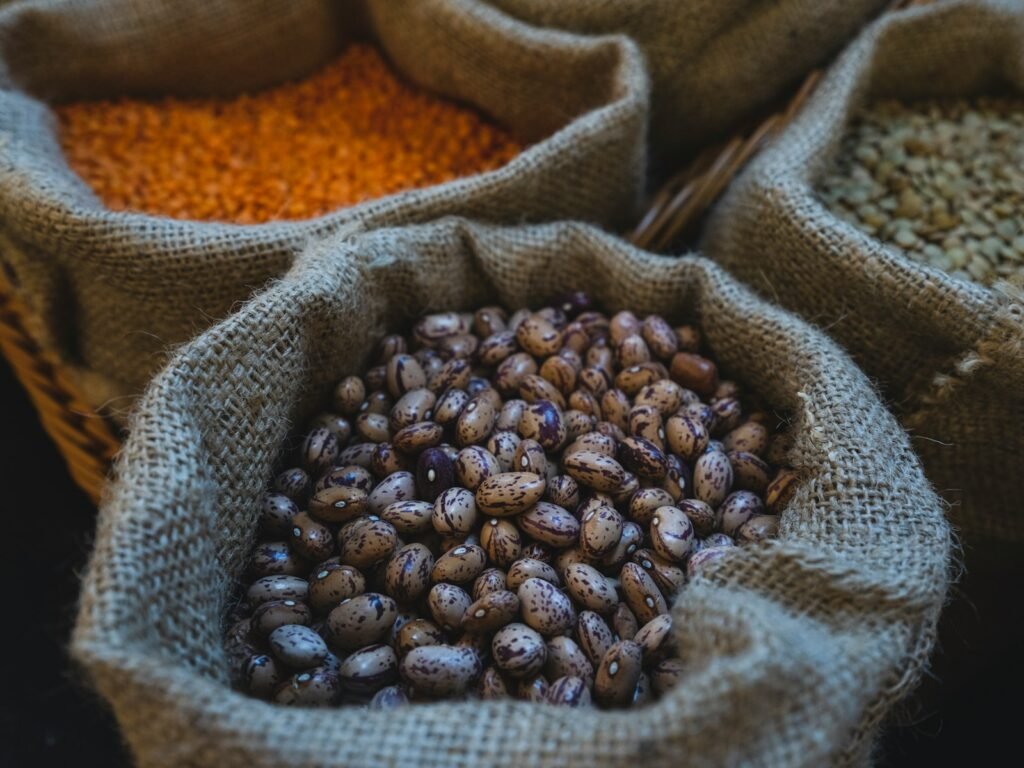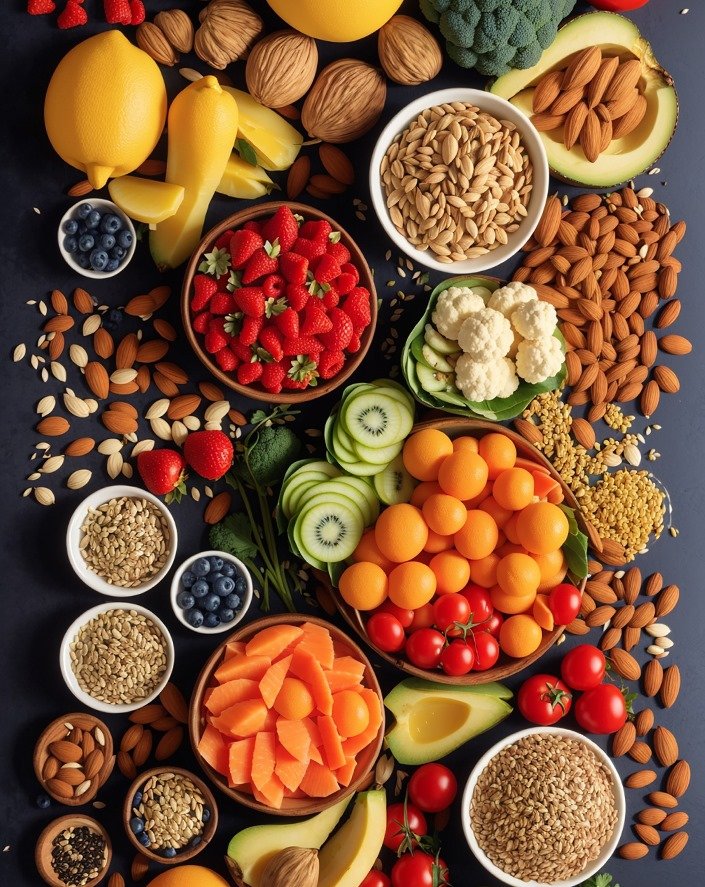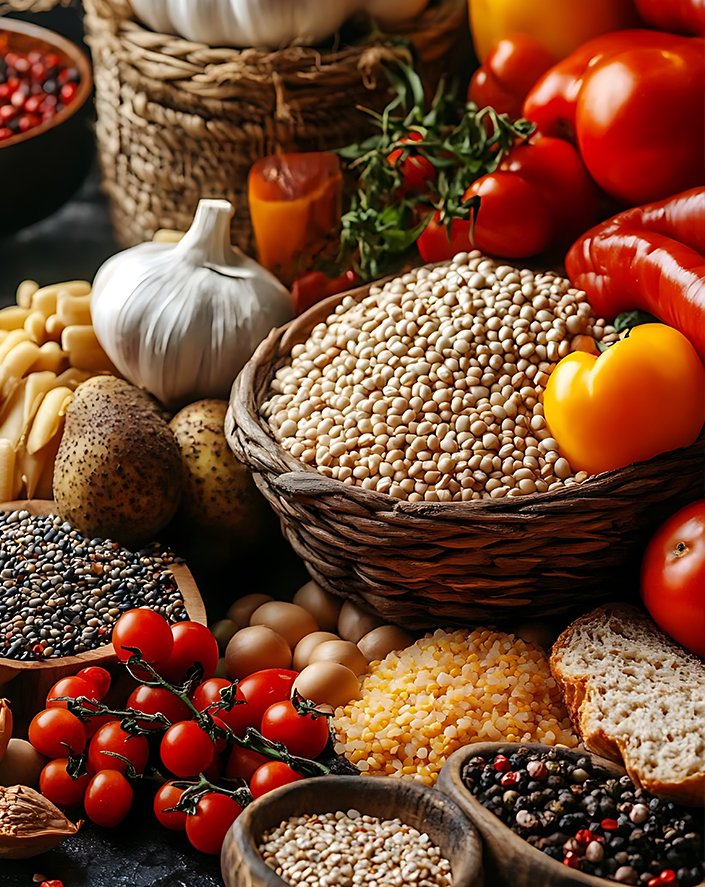Office #207-2nd Floor-ZALFA BUILDING-NEAR Jumeirah Creekside Hotel-Garhoud -Dubai UAE
Pulses Exporter UAE MKK TRADE-Pulses Exporters from UAE Delivering premium lentils, chickpeas, and beans worldwide.

MKK Trade is a prominent pulses exporter based in the UAE, specializing in the global distribution of high-quality pulses such as lentils, chickpeas, and beans. The company’s strategic location in the UAE, a major hub for international trade, allows it to efficiently source, process, and deliver pulses to markets across Africa, Asia, and the Middle East. MKK Trade takes advantage of the UAE’s world-class logistics infrastructure to ensure that its products reach customers quickly and in prime condition.
MKK Trade’s commitment to quality is evident in its rigorous sourcing and processing standards. By partnering with trusted suppliers and implementing strict quality control measures, the company ensures that its pulses meet international food safety standards. This dedication to excellence has earned MKK Trade a strong reputation as a reliable supplier of nutritious, high-grade pulses to various global markets.
In addition to its quality focus, MKK Trade emphasizes customer satisfaction by offering customized solutions for bulk orders and competitive pricing. Its ability to handle large-scale exports and maintain consistent product availability makes it a preferred partner for businesses and wholesalers in the pulses industry. Whether supplying pulses for food manufacturers or retailers, MKK Trade continues to play a crucial role in supporting global food supply chains.
MKK Trade Specialties as a UAE Pulses Exporter
MKK Trade excels in providing premium quality pulses, including lentils, chickpeas, beans, and more. The company places a strong emphasis on sourcing only the finest pulses from trusted suppliers. Through stringent quality control measures at every stage, from procurement to packaging, MKK Trade ensures that its products maintain a high level of consistency and nutritional value. This commitment to excellence has helped MKK Trade build a reputation for offering products that meet the stringent requirements of global food markets.
One of the standout specialties of MKK Trade is its tailored export solutions. The company understands the diverse needs of its clients and offers customized services to accommodate them. Whether it’s bulk order flexibility, specific packaging requirements, or personalized shipping arrangements, MKK Trade strives to adapt to the unique demands of each market it serves. This level of customization helps the company create long-term relationships with clients who rely on dependable, adaptable solutions to meet their business needs.
MKK Trade’s extensive market coverage is another key specialty. Leveraging its strategic location in the UAE, the company has established a robust distribution network, enabling it to export pulses to regions such as Africa, Asia, and the Middle East. This global reach is supported by its ability to navigate complex trade routes and utilize the UAE’s exceptional logistics infrastructure, making it a trusted partner in delivering pulses to distant markets efficiently.
Fast and reliable delivery is at the core of MKK Trade’s operations. The UAE’s advanced logistics capabilities provide MKK Trade with an edge in ensuring timely shipments. The company works with reliable freight partners and utilizes streamlined shipping processes to meet tight delivery schedules. This efficiency is critical for businesses that rely on regular, predictable supplies of pulses, allowing them to keep up with market demands without delays.
MKK Trade also places significant emphasis on quality control. The company’s processes are aligned with international food safety standards, ensuring that every batch of pulses is thoroughly inspected before shipment. This focus on quality is an integral part of MKK Trade’s operations, reflecting its commitment to delivering only the best products to its customers. The rigorous quality assurance practices further establish the company’s position as a trusted name in the pulses export industry.
Finally, MKK Trade is known for offering competitive pricing. Despite the high quality of its pulses and the complexity of its distribution network, the company provides cost-effective pricing solutions. This affordability, combined with the company’s consistent quality and reliable service, makes MKK Trade a preferred supplier for many businesses across the globe. By balancing price, quality, and service, MKK Trade continues to strengthen its position as a leading pulses exporter from the UAE.

Pulses, including lentils, chickpeas, beans, and peas, are vital for both human nutrition and global food security. They are a rich source of plant-based protein, fiber, vitamins, and minerals, making them a staple in diets around the world, especially in regions where access to animal protein is limited or costly. Pulses play a crucial role in addressing malnutrition, as their nutrient profile supports balanced diets and contributes to improved health outcomes.
In addition to their nutritional benefits, pulses are also environmentally sustainable crops. They have the ability to fix nitrogen in the soil, reducing the need for chemical fertilizers and promoting healthier, more productive farmland. This makes them essential for sustainable agriculture, particularly in regions with depleted soils or water scarcity. Pulses require less water than many other crops, making them well-suited for growth in arid environments, further underscoring their importance in food production.
Moreover, pulses are essential in global trade. As a major food commodity, they are exported across the world to meet growing demand, particularly in developing countries and regions facing food insecurity. The UAE, with its strategic position and advanced logistics infrastructure, serves as a significant hub for pulse exports, connecting producers and consumers across continents. This trade is crucial for maintaining stable food supplies in regions dependent on imported staples, ensuring that pulses continue to serve as an affordable and accessible source of nutrition worldwide.
Overall, pulses are an indispensable part of the global food system. Their nutritional value, environmental benefits, and role in international trade make them essential for supporting both human health and the planet’s agricultural future.
Pulses suppliers UAE Organic pulses UAE Fresh pulses export UAE UAE pulses importers Bulk pulses wholesale UAE Indian pulses exporter UAE Best pulses exporter UAE Premium quality pulses UAE UAE beans and lentils supplier Halal-certified pulses exporter UAE UAE pulses market suppliers Pulses export to Dubai UAE legumes and lentils distributor Bulk pulses import regulations UAE Organic pulses suppliers UAE High-quality pulses for UAE markets UAE restaurant pulses suppliers Fresh pulses for retail UAE Lentils and chickpeas supplier UAE Best quality pulses exporter to UAE Exporting pulses to UAE Organic pulses for UAE grocery stores How to import pulses to UAE Top UAE distributors for bulk pulses Pulses: An Overview Pulses, which include lentils, chickpeas, beans, and peas, are an essential part of global diets and agricultural systems. These legumes are highly regarded for their rich nutrient profile, providing an excellent source of plant-based protein, dietary fiber, vitamins, and minerals. Their versatility allows them to be used in a variety of dishes, from soups and salads to stews and snacks, making them staples in cuisines around the world. Nutritional Benefits Pulses are celebrated for their health benefits. They are low in fat and high in fiber, which aids digestion and helps maintain a healthy weight. Additionally, pulses are rich in essential amino acids, making them a valuable protein source, especially for vegetarians and vegans. Their high fiber content also contributes to improved heart health and lower cholesterol levels, while the abundance of vitamins and minerals supports overall wellness. Environmental Impact From an environmental perspective, pulses are beneficial crops. They naturally fix nitrogen in the soil, enriching it and reducing the need for synthetic fertilizers. This nitrogen-fixing ability contributes to sustainable agricultural practices, promoting healthier ecosystems. Furthermore, pulses require less water than many other crops, making them suitable for cultivation in arid and semi-arid regions, thus enhancing food security in areas facing water scarcity. Pulses Exporter UAE Pulses Exporter UAE Pulses Exporter UAE Pulses Exporter UAE Pulses Exporter UAE Pulses Exporter UAE Pulses Exporter UAE Pulses Exporter UAE Pulses Exporter UAE Pulses Exporter UAE Pulses Exporter UAE Pulses Exporter UAE Pulses Exporter UAE Pulses Exporter UAE Pulses Exporter UAE Pulses Exporter UAE Pulses Exporter UAE Pulses Exporter UAE Pulses Exporter UAE Pulses Exporter UAE Economic Importance Pulses play a significant role in global trade. They are among the most widely traded agricultural commodities, with countries around the world relying on imports to meet their consumption needs. The demand for pulses continues to grow, driven by an increasing awareness of plant-based diets and the need for sustainable food sources. The UAE, in particular, serves as a key hub for pulse exports, connecting producers to markets in Africa, Asia, and beyond. Conclusion In summary, pulses are a vital component of the global food system. Their nutritional benefits, environmental sustainability, and economic significance make them an indispensable part of diets and agriculture worldwide. As the demand for nutritious and sustainable food options continues to rise, pulses are poised to play an even more critical role in addressing global food security Here are some common myths about pulses, along with the facts that debunk them: 1. Myth: Pulses Are Low in Protein Quality Fact: While pulses are primarily considered plant-based proteins, they contain essential amino acids that contribute to protein quality. When combined with grains, pulses can provide a complete protein source, making them an excellent choice for vegetarians and vegans. 2. Myth: Pulses Cause Gas and Bloating Fact: It’s true that some people may experience gas or bloating after consuming pulses due to their high fiber content and certain carbohydrates called oligosaccharides. However, these effects can be minimized by gradually increasing pulse intake, soaking beans before cooking, and cooking them thoroughly. Pulses Exporter UAE Pulses Exporter UAE Pulses Exporter UAE Pulses Exporter UAE Pulses Exporter UAE Pulses Exporter UAE Pulses Exporter UAE Pulses Exporter UAEVVVVVV Pulses Exporter UAE Pulses Exporter UAE Pulses Exporter UAE Pulses Exporter UAE Pulses Exporter UAE Pulses Exporter UAE Pulses Exporter UAE Pulses Exporter UAE Pulses Exporter UAE VV Pulses Exporter UAE 3. Myth: All Pulses Are the Same Fact: Pulses come in various types, each with distinct flavors, textures, and nutritional profiles. For example, lentils cook quickly and are high in iron, while chickpeas are versatile and rich in fiber. Understanding the differences can help in selecting the right pulse for specific recipes and nutritional needs. 4. Myth: Pulses Are Not Suitable for Weight Loss Fact: Pulses are actually beneficial for weight management due to their high fiber content, which promotes feelings of fullness and reduces overall calorie intake. Their low glycemic index also helps stabilize blood sugar levels, making them a smart choice for those looking to lose or maintain weight. 5. Myth: Pulses Are Only for Vegetarian or Vegan Diets Fact: While pulses are a staple in vegetarian and vegan diets, they can be enjoyed by everyone. They complement a wide range of dishes, adding nutrition and flavor, and can be incorporated into meals alongside meat or dairy for added health benefits. 6. Myth: Canned Pulses Are Less Nutritious Fact: Canned pulses can be just as nutritious as dried pulses, as they retain their protein, fiber, vitamins, and minerals during processing. However, it’s essential to choose low-sodium options and rinse them before consumption to reduce excess sodium. 7. Myth: Pulses Are Expensive Fact: Pulses are often one of the most affordable sources of protein and nutrients. They are typically less expensive than meat and can provide substantial nutrition for their cost, making them a budget-friendly food choice. 8. Myth: Eating Pulses Every Day Is Bad for Health Fact: Consuming pulses regularly is generally safe and healthy for most people. They offer numerous health benefits, including improved heart health, better digestion, and increased satiety. However, individuals with specific digestive conditions should consult a healthcare professional. Conclusion By debunking these myths, it becomes clear that pulses are a nutritious, versatile, and sustainable food choice that can fit into any diet. Their benefits extend beyond nutrition to environmental sustainability and economic importance, making them a ke Pulses, which include lentils, chickpeas, beans, and peas, offer numerous advantages that contribute to individual health, environmental sustainability, and economic stability. Here are some key benefits: 1. Nutritional Benefits High in Protein: Pulses are an excellent source of plant-based protein, making them a staple for vegetarians and vegans. They provide essential amino acids that support muscle health and overall bodily functions. Rich in Fiber: Pulses are high in dietary fiber, which aids digestion, promotes satiety, and helps regulate blood sugar levels. High fiber intake is linked to a reduced risk of chronic diseases, such as heart disease and type 2 diabetes. Low in Fat: Most pulses are low in fat, making them heart-healthy food choices that can contribute to weight management and cardiovascular health. Vitamins and Minerals: Pulses are rich in essential nutrients, including iron, magnesium, potassium, and folate, which are important for various bodily functions, including energy production, blood pressure regulation, and DNA synthesis. 2. Environmental Sustainability Nitrogen Fixation: Pulses have the ability to fix atmospheric nitrogen into the soil, enhancing soil fertility and reducing the need for synthetic fertilizers. This contributes to more sustainable farming practices and healthier ecosystems. Water-Efficient Crop: Pulses typically require less water than many other crops, making them suitable for cultivation in arid and semi-arid regions. This helps conserve water resources and promotes sustainable agriculture in water-scarce areas. Lower Carbon Footprint: The cultivation of pulses often results in lower greenhouse gas emissions compared to animal protein production, making them a more environmentally friendly food option. 3. Economic Advantages Affordable Source of Nutrition: Pulses are generally cost-effective compared to other protein sources, such as meat and dairy. This makes them accessible to a wide range of consumers, particularly in developing countries where food security is a concern. Job Creation: The production, processing, and distribution of pulses create jobs in agriculture, manufacturing, and trade, supporting local economies and livelihoods. Market Demand: With the growing trend towards plant-based diets and increased awareness of sustainability, the demand for pulses is on the rise, presenting economic opportunities for farmers and exporters. 4. Culinary Versatility Variety of Uses: Pulses can be incorporated into a wide range of dishes, from soups and salads to stews and snacks. They can also be processed into flour, spreads, and other products, making them versatile ingredients in many cuisines. Cultural Significance: Pulses are integral to many traditional dishes worldwide, providing cultural and culinary richness while promoting diverse eating habits. Conclusion The advantages of pulses are multifaceted, encompassing health benefits, environmental sustainability, economic viability, and culinary versatility. Incorporating pulses into diets not only supports individual health but also contributes to a more sustainable and resilient food system, making them an essential component of global nutrition and agriculture. Disadvantages of Pulses While pulses offer numerous benefits, there are also some disadvantages and challenges associated with their consumption and cultivation. Here are some key drawbacks: 1. Digestive Issues Gas and Bloating: Pulses contain complex carbohydrates, such as oligosaccharides, which can lead to gas and bloating for some individuals. This is particularly common for those who are not accustomed to a high-fiber diet. Possible Allergies: Some people may have allergies or sensitivities to certain types of pulses, which can result in digestive discomfort or other allergic reactions. 2. Nutrient Absorption Anti-Nutrients: Pulses contain anti-nutrients like phytic acid and tannins, which can inhibit the absorption of essential minerals such as iron, zinc, and calcium. While soaking and cooking can reduce these compounds, they can still pose challenges for those relying heavily on pulses for their nutrition. Limited Essential Amino Acids: While pulses are a good source of protein, they may lack sufficient amounts of certain essential amino acids, particularly methionine. Combining them with grains can help achieve a complete protein profile, but it requires careful dietary planning. 3. Culinary Limitations Long Cooking Times: Dried pulses often require soaking and longer cooking times, which can be inconvenient for individuals seeking quick meal options. Canned pulses can mitigate this issue but may contain added sodium. Flavor and Texture Preferences: Some people may dislike the taste or texture of certain pulses, which can limit their acceptance and consumption in various cultures or demographics. 4. Agricultural Challenges Pest and Disease Vulnerability: Pulses can be susceptible to various pests and diseases, which can impact crop yields. Farmers must manage these risks through integrated pest management and crop rotation strategies. Market Price Volatility: The prices of pulses can fluctuate based on supply and demand dynamics, which can affect farmers' income stability and overall economic viability in regions heavily reliant on pulse cultivation. 5. Environmental Concerns Land Use: While pulses are generally more sustainable than animal agriculture, their cultivation still requires land, water, and resources. Unsustainable farming practices can lead to soil degradation and other environmental issues if not managed properly. Transportation Impact: Depending on where they are grown and how they are transported, pulses may still contribute to carbon emissions associated with shipping and distribution, particularly if sourced from faraway regions. Conclusion While pulses are a nutritious and sustainable food source, it is essential to be aware of their potential disadvantages. Understanding these challenges can help consumers and producers make informed decisions about incorporating pulses into diets and agricultural systems while mitigating any negative impacts.


